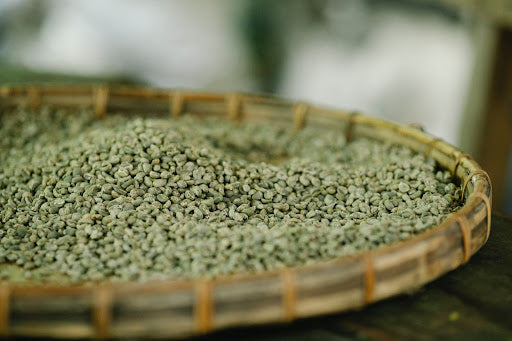If you love the taste of coffee but are sensitive to any amount of caffeine, you may enjoy a good decaf.
And if decaf is indeed your “cup of joe”, it's important to know the process that is used to make your decaf coffee beans. Chances are you may actually be gulping down chemicals with your morning brew – without even realizing it.
See, most decaf coffee is actually decaffeinated using chemicals that have been linked to serious health issues and even cancers if ingested in big amounts over longer periods of time. (Note, this is not just a warning for Californians).
Now, don’t panic – there is a solution (and we will get it here). But first, why are there chemicals in some decaf coffee to begin with? And how good is decaf for you, really?
Glad you asked – let’s have a look at the coffee bean decaffeination process, shall we?
How Do You Make Decaf Coffee?
Removing caffeine out of a coffee bean isn’t as straightforward as you might think. There are two main processes - The Solvent Method and The Swiss Water Process - and we’ll dive into those in a second. But first, let’s look at what they both have in common – water.
The process of extracting caffeine relies on the fact that caffeine is water soluble, which means that when beans are submerged or washed in water for a long time, the caffeine dissolves into the water – taking the caffeine out of the bean, leaving a sort of "caffeine soup".

But coffee beans are complex, and contain over 1000 different compounds that all play their part in bringing out the rich flavors and aromas you know and love.
So here’s the tricky part – those beneficial compounds you still want in your coffee are also water soluble. Meaning, when the caffeine dissolves in the water, so does all the good stuff we want to keep for flavor and nutrients. So how do you separate the good from the bad?
Some coffee scientists in the the early 20th century, discovered they could remove caffeine without removing everything else by using certain chemicals.
It turns out certain “solvents” will bond to the caffeine, making it possible to isolate it from this "caffeine soup" while still leaving the good stuff behind. They called it the Solvent Method.
During this Solvent Method, the unroasted beans are soaked in water for nearly ten hours – causing all the caffeine and other compounds to dissolve into the water (creating the aforementioned "caffeine soup"). The water is separated from the beans, and then agitated for another ten hours with Ethyl Acetate – a chemical that bonds only to the caffeine. When the water is then heated, the caffeine-bonded solvent evaporates, bringing the caffeine with it, but leaving the nutrients and flavor elements, which can then be absorbed back into the coffee beans.
And just like that, the caffeine is gone.
Another approach to the Solvent Method involves washing the beans for several hours with a different solvent called Dichloromethylene or Methylene Chloride (we’re not sure about you, but neither of these sound like something we want to drink...).

Is the solvent method fascinating? Sure. But the tradeoff is residual chemicals. Chemicals that recently have been linked to harmful outcomes...
Methylene Chloride is identified by OSHA as a Potential Occupational Carcinogen – and carcinogens are chemicals that can cause cancer. Now, while it sounds crazy that this has been approved for the decaffeinating process, its status as occupational means that only concentrated doses over longer periods of time are of real concern. And since the doses left in the beans are so small, the FDA has approved it.
But even consuming small amounts of Methylene Chloride can have side effects, such as headaches, drowsiness, irritability, lightheadedness and coughing or wheezing. Not exactly what you’re looking to get out of your daily cup of joe, is it?
Even though, Ethyl Acetate has been approved because the amount found in decaf coffee is very small, large intakes over a long period of time leads to substantial damage. Also, it has a GHS Classification 3, with the main concerns being toxicity for human organs and the nervous system – and besides, it can cause irritation on skin, eyes, nose and throat.
Yikes.
Decaf coffees with Ethyl Acetate often get marketed as ‘naturally decaffeinated’, which might mislead you. Since the chemical can be naturally found in ripe fruits like blackberries or strawberries, this terminology is technically allowed.
Does it mean the chemical used to decaffeinate your coffee comes from nature? Not necessarily. Ethyl Acetate can just as easily be made in a lab, and since it’s cheaper… Well. It’s mostly made in a lab.
These mad scientists didn't have it all figured out.

Despite all this, it’s worth noting that the real health concerns for both of these chemicals come from higher doses than what you’ll find in your cup.
Still, we do know that some chemicals slip through.
Why risk it? Especially when there’s a completely natural and chemical free way to get your decaf fix.
Intorducing: The Swiss Water Process.

The Chemical-Free Decaf Coffee Solution: The Swiss Water Process
The good news for you is that there’s a chemical-free solution for a delicious decaf cup, and it’s called the Swiss Water Process.
And yes – it uses only water.
But instead of adding chemicals to separate the caffeine from this nutrient rich "caffeine soup", the solution is instead run through a carbon filter that removes the caffeine – and the caffeine only. Simple as that. The flavor and nutrients can then be absorbed back into the beans, all thanks to the Swiss Water Process.
And voilá! Decaffeinated coffee beans.
Don’t worry – carbon is not a chemical. It’s a naturally occurring element, like oxygen or hydrogen, and the basis of all life on our planet. In other words, it’s harmless. And found abundantly in nature.

The Swiss Water Process decaf actually tends to perform better both in flavor and caffeine removal. Which begs the common question about the healthfulness of decaf.
Is Decaf Coffee Good For You?
The short answer is yes. But look for a Swiss Water Process Decaf.

As mentioned in our last article, coffee itself (so long as it with grown without chemcals) is quite healthy. Of the studies on decaf the ones comparing regular vs decaf coffee have found them to have similar health benefits. For example, they’ve been linked to reduced risk of Type 2 diabetes and even certain types of cancer.
On top of that, in 2017 there was a study on decaf that linked frequent intake to a reduced risk of cardiovascular diseases – which sounds pretty good to us.
But sadly, if you’re drinking a Solvent Method Decaf, chemicals in your cup could negate some of these health benefits.
Another common question is about caffeine level in decaf coffee...
Is Decaf Coffee Really Decaf?
Swiss Water Process Decaf is tested regularly, and on average tests 99.9% caffeine free, containing 1-2% the original caffeine amount.
And since the water’s already saturated with all the aromas and nutrients, it’s only the caffeine that seeps out – meaning none of the flavors are damaged in the process. How about sustainability?
Is Decaf Coffee Sustainable?
The best part about Swiss Water Process decaf is that the same water can be used over and over, by simply running it through the carbon filter again – meaning, the waste overall is very low.
Which makes the Swiss Water Process one of the most sustainable decaffeinating processes available today. Pretty incredible, isn’t it?
In Conclusion: Look for Swiss Water Process Decaf
At Peak State, one of our core values is to create high-quality coffee while minimizing harm to the planet. That’s why our Calm Descent Decaf Coffee is Fair Trade, organic, shade grown, and of course – decaffeinated using the Swiss Water Process.
It also comes with the added health benefits of Cordyceps and Lion’s Mane for natural energy support and fuel for your brain with healthy ingredients only from nature. What’s not to like about that?

Enjoy a delicious decaf brew that’s truly good for you. Or, if you’re ready to commit – save a few bucks on a monthly subscription, and we’ll deliver our delicious, healthy decaf right to your doorstep!
Psst… Curious about our coffee infusion process? Read more about it here!


